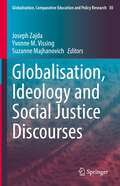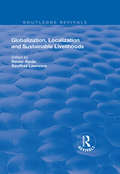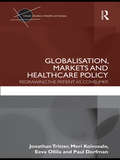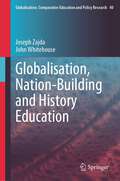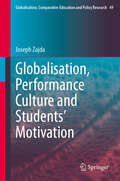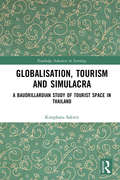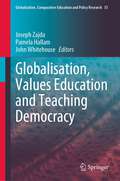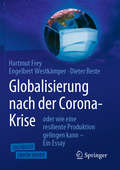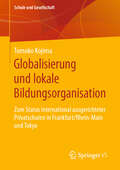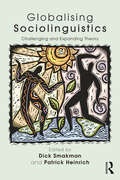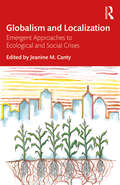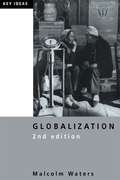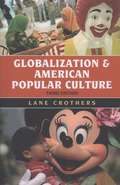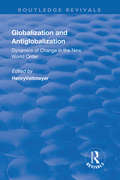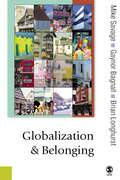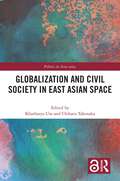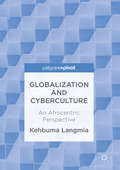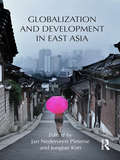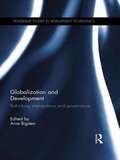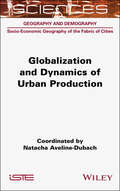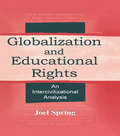- Table View
- List View
Globalisation, Ideology and Social Justice Discourses (Globalisation, Comparative Education and Policy Research #30)
by Joseph Zajda Suzanne Majhanovich Yvonne M. VissingThis book examines dominant discourses in social justice education globally. It presents cutting-edge research on the major global trends in education, social justice and policy research. Using diverse paradigms, ranging from critical theory to discourse analysis, the book examines major social justice and equity education reforms and policy issues in a global culture, with a focus on the ambivalent and problematic relationship between social justice education discourses, ideology and the state. The book discusses democracy, ideology and social justice, which are among the most critical and significant factors defining and contextualising the processes surrounding social justice education reforms globally. It critiques current social justice education practices and policy reforms, illustrating the shifts in the relationship between the state, ideology, and social justice education policy.Written by authors from diverse backgrounds and regions, this book examines current developments in research concerning social justice education. It enables readers to gain a more holistic understanding of the nexus between social justice education, and dominant ideologies, both locally and globally. It also provides an easily accessible, practical, yet scholarly insights into local and global trends in the field of social justice education. Discourses of Globalization, Ideology and Social Justice, with contributions from key scholars worldwide, should be required reading for a broad spectrum of users, including policy-makers, academics, graduate students, education policy researchers, administrators, and practitioners.
Globalisation, Localisation and Sustainable Livelihoods
by Geoffrey Lawrence Reidar AlmasThis title was first published in 2002. One of the greatest concerns facing the world is how to ensure that sustainable outcomes are generated as globalization proceeds apace. Quite simply, many people are finding their life chances deteriorating - with resistance to globalization being a common response. The question is: is it possible to guarantee sustainable livelihoods for individuals, families and communities as global processes increasingly shape local social relations? This volume is a collection of 16 chapters from leading rural sociologists and human geographers based in Europe, Australasia, and the Americas. The book, in three parts, deals with globalization and food; the restructuring of local agriculture; and communities and resistance in a globalizing world. The introduction to the book compares and contrasts the various experiences of communities in countries such as Australia, Brazil, Finland, Norway, South Africa and the United States as they "struggle" to cope with globalization and its effects. Each chapter discusses options to ameliorate the local consequences of global change.
Globalisation, Markets and Healthcare Policy: Redrawing the Patient as Consumer (Critical Studies in Health and Society)
by Jonathan Tritter Meri Koivusalo Eeva Ollila Paul DorfmanAlthough the last two decades have seen the healthcare systems of most developed countries face pressure for major reform, the impact of this reform on the relationship between empowerment, consumerism and citizen’s rights has received limited research attention. Globalisation, Markets and Healthcare Policy sets out to redress this imbalance. This book explores the extent to which globalisation and commercialisation relate to current and emerging health policies. It also looks at the implications for citizens, patients and social rights, as well as how policy making interacts with the interests of global and European trade and economic policies. Topics discussed include: How the impact of globalisation on health systems is apparent in the influence of international actors and European policies. How the impact of globalisation is mediated by national priorities and policies and is therefore reflected in diverse influences. How commercialisation of health is presented as benefiting citizens and patients but has the potential to undermine the aims and values inherent in health systems. How the role of citizens' interests, social rights, patient’s rights and priorities of patient and public involvement need to be separated from commercialisation, choice and consumerism in health care. Essential reading for policy makers and students of public policy, politics, law and health services, Globalisation, Markets and Healthcare Policy will also appeal to those interested in patient involvement international healthcare, international relations, trans-national organisations and the EU.
Globalisation, Nation-Building and History Education (Globalisation, Comparative Education and Policy Research #40)
by Joseph Zajda John WhitehouseThis book uses historiography and discourse analysis to provide a new insight into understanding the nexus between ideologies, the state, and nation-building—as depicted in history school textbooks. It focuses on the interpretation of social and political change, significant events, and examining possible new biases and omissions in school textbooks. The ‘Europeanization’ of history textbooks in the EU is an example of western-dominated Grand Narrative of pluralist democracy, multiculturalism, and human rights, according to the canon of a particularly European dimension. Various public debates in the USA, China, the Russian Federation (RF), Japan, and elsewhere, dealing with understandings of a nation-building, national identity, and history education point out to parallels between the political significance of school history and the history education debates globally.The book demonstrates that the issue of national identity and balanced representations of the past continue to dominate the debate surrounding the goals, dominant ideologies and content of history textbooks, and historical narratives. It concludes that competing discourses and ideologies will continue to define and shape the nature and significance of historical knowledge, ideologies and the direction of values education in history textbooks. This book provides an easily accessible, practical, yet scholarly insights into local and global trends in the field of history education, and should be required reading for a broad spectrum of users, including policy-makers, academics, graduate students, education policy researchers, administrators, and practitioners.
Globalisation, Performance Culture and Students’ Motivation (Globalisation, Comparative Education and Policy Research #49)
by Joseph ZajdaThis book analyses education policy trends that affects performing culture, academic excellence and global competitiveness in schools. It focuses on students’ cultural identities and engagement, inclusive schooling, eliminating discrimination and discriminatory practices in the classroom, and relevant values education. One of the major effects of cultural and economic forces of globalisation is that schools and school leaders, like other educational organisations, having modelled their goals and strategies on the entrepreneurial business model. They are compelled to embrace the corporate ethos of efficiency, accountability, performance, and profit-driven managerialism. This corporate ethos reflects a dominant neo-liberal ideology, which exerts a powerful influence on major discourses of democracy, equality, social justice, and education, both locally and globally. By examining the education policy shifts in the use of major discourses concerning performing culture and education, this book offers a comprehensive synthesis of the intersecting and diverse discourses of globalisation, cultural diversity, performing culture, and education. It provides innovative ideas concerning the future directions for authentic models of globalisation, performance culture and students’ motivation.
Globalisation, Tourism and Simulacra: A Baudrillardian Study of Tourist Space in Thailand (Routledge Advances in Sociology)
by Kunphatu SakwitThis book draws on the thought of Baudrillard to explore the effects of globalisation and tourism in a Thai context. Arguing that tourism does not necessarily erode local culture but that local culture can in fact be recreated through globalisation and tourism, the author employs studies of the Damnoen Saduk and Pattaya floating markets, showing them to be simulations of Thai culture that undergo changes of form, cultural content and activity, through various stages of representation. With a focus on the themes of the circulation of value and signs, the play of differences and orders of simulacra, this volume examines the extent to which Baudrillard’s theory can apply in a non-western context and in relation to tourism. A study of consumption, tourism and the relations between the global and the local, Globalisation, Tourism and Simulacra will appeal to scholars of sociology and geography with interests tourism, globalisation and social theory.
Globalisation, Values Education and Teaching Democracy (Globalisation, Comparative Education and Policy Research #35)
by Joseph Zajda Pamela Hallam John WhitehouseThis book critiques dominant discourses and debates pertaining to values education, cultural identity and teaching democracy, set against the backdrop of growing social stratification and unequal access to quality education. It addresses discourses concerning globalisation, ideologies and the state, as well as approaches to values education and teaching democracy in schools. The book explores the ambivalent and problematic connections between the state, globalisation, values education and teaching democracy. It also explores conceptual frameworks and methodological approaches applicable to research on values education, multiculturalism and identity politics. Drawing on diverse paradigms, ranging from critical theory to globalisation, and by focusing on globalisation, ideology and values education, the book critically examines research dealing with cultural diversity and its impact of identity politics. Given the need for a multiple perspective approach, the authors have diverse backgrounds and hail from different countries and regions, offer a wealth of insights, contributing to a more holistic understanding of the nexus between values education, multiculturalism and national identity. With contributions from key scholars worldwide, the book should be required reading for a broad spectrum of users, including policy-makers, academics, graduate students, education policy researchers, administrators and practitioners.
Globalisierung nach der Corona-Krise: oder wie eine resiliente Produktion gelingen kann – Ein Essay
by Engelbert Westkämper Dieter Beste Hartmut FreyUnterbrochene Lieferketten, Schwierigkeiten im Nachschub einfachster medizinischer Schutzkleidung (z. B. Mundschutz) im Rahmen der Corona-Krise bieten Anlass die Globalisierung zu hinterfragen. Den gegenwärtigen Spielregeln der Globalisierung sind die Perspektiven einer digitalisierten Wirtschaftsordnung mit entsprechenden Geschäftsmodellen für die Zukunft gegenübergestellt. Es ist dargelegt, welche Prozesse und Verfahren diese Entwicklung unterstützen und es ist ein Ausblick gegeben, wie sich diese Entwicklung auch auf bildungs- und forschungspolitische Aspekte auswirken kann.
Globalisierung und lokale Bildungsorganisation: Zum Status international ausgerichteter Privatschulen in Frankfurt/Rhein-Main und Tokyo (Schule und Gesellschaft #71)
by Tomoko KojimaDie qualitative Vergleichsstudie beschäftigt sich mit der Frage, wie sich die lokale Bildungsorganisation gegenwärtig hinsichtlich der Globalisierung und der Präsenz der Privatschulen mit internationalem Profil verändert. Betrachtet werden exemplarische Fälle in zwei global cities, Frankfurt/Rhein-Main und Tokyo. Dabei werden unterschiedliche Formen international ausgerichteter Privatschulen sowie ihre Differenzierung von bzw. Identifikation mit dem lokalen Bildungskontext aufgezeigt. Die damit einhergehende Überschreitung von Grenzen im nationalstaatlichen Erziehungssystem und deren Folgen werden semantisch aus der Governance-Perspektive sowie aus systemtheoretischer Sicht regional kontrastierend diskutiert.
Globalising Sociolinguistics: Challenging and Expanding Theory
by Dick Smakman Patrick HeinrichThis book challenges the predominance of mainstream sociolinguistic theories by focusing on lesser known sociolinguistic systems, from regions of Africa, Asia, the Caribbean, South America, the European Mediterranean, and Slavic regions as well as specific speech communities such as those speaking Nivkh, Jamaican Creole, North Saami, and Central Yup’ik. In nineteen chapters, the specialist authors look at key sociolinguistic aspects of each region or speech community, such as gender, politeness strategies, speech patterns and the effects of social hierarchy on language, concentrating on the differences from mainstream models. The volume, introduced by Miriam Meyerhoff, has been written by the leading expert of each specific region or community and includes contributions by Rajend Mesthrie, Marc Greenberg and Daming Xu. This publication draws together connections across regions/communities and considers how mainstream sociolinguistics is incomplete or lacking. It reveals how lesser-known cultures can play an important role in the building of theory in sociolinguistics. Globalising Sociolinguistics is essential reading for any researcher in sociolinguistics and language variation and will be a key reference for advanced sociolinguistics courses.
Globalism and Localization: Emergent Solutions to Ecological and Social Crises
by Jeanine M. CantyConsidering the context of the present ecological and social crisis, this book takes an interdisciplinary approach to explore the relationship between globalism and localization. Globalism may be viewed as a positive emergent property of globalization. The latter depicts a worldwide economic and political system, and arguably a worldview, that has directly increased planetary levels of injustice, poverty, militarism, violence, and ecological destruction. In contrast, globalism represents interconnected systems of exchange and resourcefulness through increased communications across innumerable global diversities. In an economic, cultural, and political framework, localization centers on small-scale communities placed within the immediate bioregion, providing intimacy between the means of production and consumption, as well as long-term security and resilience. There is an increasing movement towards localization in order to counteract the destruction wreaked by globalization, yet our world is deeply and integrally immersed within a globalized reality. Within this collection, contributors expound upon the connection between local and global phenomenon within their respective fields including social ecology, climate justice, ecopsychology, big history, peace ecology, social justice, community resilience, indigenous rights, permaculture, food justice, liberatory politics, and both transformative and transpersonal studies.
Globalization (Key Ideas)
by Malcolm WatersThe constraints of geography are shrinking and the world is becoming a single place. Globalization and the global society are increasingly occupying the centre of sociological debates. Widely discussed by journalists and a key goal for many businesses, globalization has become a buzz-word in recent years. In this extensively revised and restructured new edition of Globalization , Malcolm Waters provides a user-friendly introduction to the main arguments about the process, including a chapter on the critiques of the globalization thesis that have emerged since the first edition was published.
Globalization East and West: Perspectives From The Gulf (Encounters: An International Journal For The Study Of Culture And Society Ser. #Vol. 8)
by Bryan S. Turner Habibul H. KhondkerDo we confuse globalization for Americanization? What are the distinctive elements in the interplay of the local and the global?<P><P> This much needed book is the first full length text to examine globalization from the perspective of both the West and the East. It considers globalization as a general social and economic process, and the challenges it presents for Western social science. <P> The meaning of a global perspective is explored through various concrete examples: religion, migration, medicine, terrorism, global disasters, citizenship, multiculturalism, media and popular culture. <P> Introduced with a forword from Roland Robertson, the book is brimming with novel interpretations and fresh insights that will contribute to illuminating the practical realities of globalization.
Globalization and American Popular Culture (Globalization)
by Lane CrothersNow in a fully revised and updated edition, this concise and insightful book explores the ways American popular products such as movies, music, television programs, fast food, sports, and even clothing styles have molded and continue to influence modern globalization. Lane Crothers offers a nuanced examination of both the appeal of American products worldwide and the fear and rejection they induce in many people and nations around the world. The author defines what we mean by "popular culture," how popular culture is distinguished from the generic concept of "culture," and what constitutes "American" popular culture. Tracing how U.S. movies, music, and TV became dominant in world popular culture, Crothers also considers the ways in which non-visual products like fast-food franchises, sports, and fashion have become ubiquitous. Concluding with a projection of the future impact of American popular culture, this book makes a powerful argument for its central role in shaping global politics and economic development.
Globalization and Antiglobalization: Dynamics of Change in the New World Order (The\international Political Economy Of New Regionalisms Ser.)
by Jonathan RutherfordThis title was first published in 2003. Globalisation can be seen to provide the context for epoch-defining changes in social and economic forms of organisation. However, it has also changed the context for and the organisational forms of politics, unleashing forces in support of, and in opposition to, the globalisation dynamic. This text examines the dynamics of change and development in two regions of the world economy, Latin America and Asia, and is a series of explorations into the forces, their political dynamics, and the responses of governments and citizens. The focus of the explorations, and regional case studies, is on the role of the nation-state, international organisations and social movements.
Globalization and Belonging (Published in association with Theory, Culture & Society)
by Mike Savage Gaynor Bagnall Brian Longhurst'Globalization and Belonging's headline message - that place matters, that locality remains vital to people, is arresting' - Frank Webster, Professor of Sociology, City University, London Drawing on long-term empirical research into cultural practices, lifestyles and identities, Globalization and Belonging explores how far-reaching global changes are articulated locally. The authors address key sociological issues of stratification as analysis alongside 'cultural' issues of identity, difference, choice and lifestyle. Their original argument: " Shows how globalisation theory conceives of the 'local' " Reveals that people have a sense of elective belonging based on where they choose to put down roots " Suggests that the feel of a place is much more strongly influenced by the values and lifestyles of those migrating to it " reinvigorates debates in urban and community studies by recovering the 'local' as an intrinsic aspect of globalisation Theoretically rigorous, the book is brought to life with direct quotations from the authors' research, and appeals to students in urban sociology, urban geography, media studies and cultural studies.
Globalization and Civil Society in East Asian Space (Politics in Asia)
by Khatharya Um Chiharu TakenakaThis book critically examines the impact of globalization, changing power dynamics, migration, and evolving rights regimes on regional order, discourse of national governance, state and society relations, and the development of civil society in East Asia. Providing a textured, critical reading of East Asia as an economically, socially, and politically dynamic region, this book also presents the region as one shaped simultaneously by progressive as well as regressive pulls. Attentive to prevailing issues as well as to states’ and civil societies’ responses to them, it focuses on changing societies and politics in East Asia, particularly on shifting notions of citizenship, nationhood, and peoplehood. The contributions feature new and timely conclusions drawn from multidisciplinary fields including law, public policy, sociology, Asian studies, gender, sexuality, and ethnic studies and include direct testimonies from citizens of East and Southeast Asia. Globalization and Civil Society in East Asian Space will appeal to students and scholars of sociology, political science, and Asian studies more broadly.
Globalization and Civil Society in East Asian Space (Politics in Asia)
by Khatharya Um Chiharu TakenakaThis book critically examines the impact of globalization, changing power dynamics, migration, and evolving rights regimes on regional order, discourse of national governance, state and society relations, and the development of civil society in East Asia.Providing a textured, critical reading of East Asia as an economically, socially, and politically dynamic region, this book also presents the region as one shaped simultaneously by progressive as well as regressive pulls. Attentive to prevailing issues as well as to states’ and civil societies’ responses to them, it focuses on changing societies and politics in East Asia, particularly on shifting notions of citizenship, nationhood, and peoplehood. The contributions feature new and timely conclusions drawn from multidisciplinary fields including law, public policy, sociology, Asian studies, gender, sexuality, and ethnic studies and include direct testimonies from citizens of East and Southeast Asia.Globalization and Civil Society in East Asian Space will appeal to students and scholars of sociology, political science, and Asian studies more broadly.
Globalization and Culture: Global Melange
by Jan Nederveen PieterseIs there cultural life after globalization? Jan Nederveen Pieterse argues that what is taking place today is a global melange, a culture of hybridization.
Globalization and Cyberculture
by Kehbuma LangmiaThis book argues for hybridity of Western and African cultures within cybercultural and subcultural forms of communication. Kehbuma Langmia argues that when both Western and African cultures merge together through new forms of digital communication, marginalized populations in Africa are able to embrace communication, which could help in the socio-cultural and political development of the continent. On the other hand, the book also engages Richard McPhail's Electronic Colonization Theory in order to demonstrate how developing areas such as Africa experience a new form of imperialistic subjugation because of electronic and digital communication. Globalization and Cyberculture illustrates how new forms of communication inculcate age-old traditional forms of communications into Africa's cyberculture while complicating notions of identity, dependency, and the digital divide gap.
Globalization and Development in East Asia (Routledge Studies in Emerging Societies #2)
by Jan Nederveen Pieterse Jongtae KimEast Asia is widely regarded as the main "winner" in contemporary globalization, unscathed by the economic crisis of 2008, with its leading new industrializing nations and emerging economies. While 20th-century globalization was mainly led by the West, the 21st century is ushering in different dynamics. The re-emergence of Asia involves alternative visions of the world and different perspectives on globalization. This volume seeks to address these dimensions, turning to local reflexivities, notably in South Korea and China, to explore the key debates in sociology and political economy within East Asia rather than from an outside view.
Globalization and Development: Rethinking Interventions and Governance (Routledge Studies in Development Economics #102)
by Arne BigstenThe key challenge for achieving sustained development in developing countries relates to quality of domestic governance, which in turn is strongly affected by external interventions. Domestic governance includes politics, policy formulation, institution building and policy implementation. It is important for both international and domestic agents to understand how the interplay between external interventions and domestic governance affects social and economic outcomes. This volume presents a series of studies analysing the links between external interventions and domestic governance in the areas of economic, social and security policy. Key questions that are addressed here include: How do external interventions in economic, social and security areas affect domestic governance in developing countries? Is aid more effective in decentralised systems of government? What are the interactions between external interventions and domestic governance? How can external agents advance domestic governance? Due to its strong focus on external interventions and domestic governance, this book will be of interest to scholars of development studies across the social sciences, in addition to the fields of economics, political science, sociology and geography.
Globalization and Diversity: Geography of a Changing World (Second Edition)
by Lester Rowntree Martin Lewis Marie Price William WyckoffGlobalization and Diversity is an exciting contemporary approach to World Regional Geography that explicitly acknowledges the geographic changes that accompany today's rapid rate of globalization. Organizes each regional chapter into five thematic sections: Environmental Geography; Population and Settlement; Cultural Coherence and Diversity; Geopolitical Framework; Economic and Social Development.
Globalization and Dynamics of Urban Production
by Natacha Aveline-DubachOver the last 20 years, urbanization processes have undergone profound transformations under the growing influence of private actors, particularly in the financial sector. This has exposed the physical environment of various cities to global capital flows, which has generated an overall rise in real estate values on a global scale. This is often disconnected from the financial capacities of local actors – primarily households – which then increases the inequalities and vulnerabilities of societies regarding financial and environmental risks. This book offers the keys to understanding these new dynamics of capital accumulation in the general built-up environment of cities by taking into account the diversity of their configurations, their intensity and their urban effects according to national contexts. Beyond the cases involving the major Western countries, the initial centers of the financial industry and the theorizations on the urban, this book addresses the particular contexts of real estate production in four major regions: Northeast Asia, Southeast Asia, the Middle East and West Africa.
Globalization and Educational Rights: An Intercivilizational Analysis (Sociocultural, Political, and Historical Studies in Education)
by Joel SpringThis is the first book to explore the meaning of equality and freedom of education in a global context and their relationship to the universal right to education. It also proposes evaluating school systems according to their achievement of equality and freedom. Education in the 21st century is widely viewed as a necessary condition for the promotion of human welfare, and thus identified as a basic human right. Educational rights are included in many national constitutions written since the global spread of human rights ideas after World War II. But as a global idea, the meaning of educational rights varies between civilizations. In this book, which builds on the concept of the universal right to education set forth in Spring's The Universal Right to Education: Justification, Definition, and Guidelines, his intercivilizational analysis of educational rights focuses on four of the world's major civilizations: Confucian, Islamic, Western, and Hindu. Spring begins by considering educational rights as part of the global flow of ideas and the global culture of schooling. He also considers the tension this generates within different civilizational traditions. Next, he proceeds to: *examine the meaning of educational rights in the Confucian tradition, in the recent history of China, and in the Chinese Constitution; *look at educational rights in the context of Islamic civilization and as presented in the constitutions of Islamic countries, including an analysis of the sharp contrast between the religious orientation of Islamic educational rights and those of China and the West; *explore the problems created by the Western natural rights tradition and the eventual acceptance of educational rights as represented in European constitutions, with a focus on the development and prominence given in the West to the relationship between schooling and equality of opportunity; and, *investigate the effect of global culture on India and the blend of Western and Hindu ideas in the Indian constitution, highlighting the obstacles to fulfillment of educational rights created by centuries of discrimination against women and lower castes. In his conclusion, Spring presents an educational rights statement based on his intercivilizational analysis and his examination of national constitutions. This statement is intended to serve as a model for the inclusion of educational rights in national constitutions.
